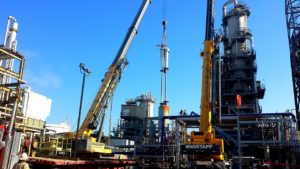 Due to the diverse application requirements, sealing solutions for the oil and gas industry presents a number of unique challenges that are arguably not found in other industries. Oil and gas industrial processes encompass an entire supply chain consisting of upstream, midstream, and downstream production concerned with exploration and extraction, transportation, storage, and refinery of crude to petroleum and other oil-based products like diesel fuel, jet fuel, and kerosene.
Due to the diverse application requirements, sealing solutions for the oil and gas industry presents a number of unique challenges that are arguably not found in other industries. Oil and gas industrial processes encompass an entire supply chain consisting of upstream, midstream, and downstream production concerned with exploration and extraction, transportation, storage, and refinery of crude to petroleum and other oil-based products like diesel fuel, jet fuel, and kerosene.
The material that offers sealing solutions for applications used in the oil and gas industry must exhibit numerous mechanical properties that provide a combination of corrosion resistance, stability under pressure, chemical resistance, and function in a wide range of temperatures. Regarding the latter, applications must operate in remote, rural environments from the barren Arctic to arid deserts to deep-sea drilling platforms. In such harsh environments, chemical and thermal degradation of seals are usually the cause of seal failure. More than downed production time, seal failure in such natural environments can have catastrophic consequences on land or sea as well as for workers who could be exposed to toxic or dangerous fumes and gases, and even fires and explosions.
How to Choose a Sealing Material for the Oil and Gas Industry
Material selection then becomes vital to ensure safe and secure extraction, production, transportation, and delivery of petroleum-based fuels and products. Three of the more prominent materials that offer reliable sealing solutions are Nitrile (Buna-N), Silicone/Fluorosilicone, and AFLAS®. Let’s take a closer look:
Nitrile (Buna-N)
As the most commonly used elastomeric material, Nitrile is a versatile seal that holds properties that provide excellent resistance for a wide range of fluids used in applications in the oil and gas industry. Nitrile gaskets, seals, and O-rings can service petroleum-based oils and fuels, silicone greases, hydraulic fluids, water, and alcohols. Nitrile’s low cost and its many favorable working properties—low compression set, high tensile strength, high abrasion resistance, and an operational temperature range of -40°F to +275°F (-40°C to +135°C), make it an ideal material for sealing applications for gasoline, oil, fuels, and related solvents and hydraulic fluids.
Silicone/Fluorosilicone
Fluorosilicone Rubber (FVMQ) is a variation of silicone distinguished by additional properties that provide stability, resistance to compression set in wide operational temperature ranges, and excellent resistance to solvents and oils and fuels common to applications for the oil and gas industry. Silicone’s silicone composition, carbon, hydrogen, and oxygen, provide this rugged elastomeric material with characteristics found in fluorosilicones. In extreme environments, silicone is non-reactive, remains stable, and has an operational temperature range from −67°F to +572° F (−55°C to +300°C).
As a variation of silicone, fluorosilicone has additional compounds that enhance its properties and performance for specific applications. It offers excellent chemical resistance. For outside sealing applications or in environments where seals are exposed to sunlight, ozone, chlorination, or aromatic hydrocarbons, fluorosilicone seals provide superior resistance. Fluorosilicone O-ring applications service petroleum-based oils and/or hydrocarbon fuels. However, though their maximum service temperature is slightly lower than silicone, they provide exceptional sealing in fuel systems at high temperatures up to +350°F (+177°C) or in applications where the dry-heat resistance of silicone O-rings is required. At the other end of the temperature scale, fluorosilicone O-rings continually perform at temperatures as low as -73°C (-100°F).
AFLAS®
AFLAS®, or its generic equivalent, TFE/P (a copolymer of tetrafluoroethylene and propylene with approximate 54% fluorine content), offers resistance to petroleum products, steam, and phosphate-esters. Though at high temperatures, its compression set resistance is weaker compared to other standard fluorocarbons—its operational service temperature range is 25°F to +400°F (-5°C to +204°C)—it does provide an improved chemical resistance for a wide variety of automotive fluids and additives. AFLAS® is perfect for seals used in hot water and steam applications up to +170°C (+340°F), heat transfer media, acids and bases, and amines. It resists motor oils of all grades, and engine coolants, extreme pressure (EP) gear lubricants, brake fluids, and transmission and power steering fluids.

